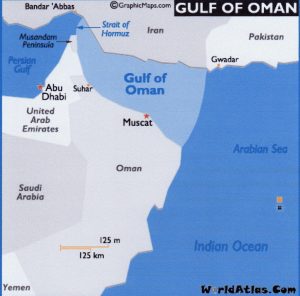Dead zone in the Sea of Oman
Advertisement – Advertise here from OMR 100 / $275 USD
Al-Sahawat Times | Ethical Global News from Oman and UAE | Donate HERE
Advertisement – Advertise here from OMR 100 / $275 USD
New research from the University of East Anglia (UEA) has confirmed a dramatic decrease in oxygen in the Sea of Oman part of the Arabian Sea. But the environmental disaster is worse than expected.
The ‘dead zone’ was confirmed by underwater robots called Seagliders which were able to collect data in areas of water previously inaccessible due to the piracy and geopolitical tensions.
The robots are about the same size as a small human diver, but can reach depths of 1KM and travel the ocean for months, covering thousands of kilometres. Two gliders were deployed in the Sea of Oman for eight months.
They communicated by satellite to build an underwater picture of oxygen levels, and the ocean mechanics that transport oxygen from one area to another. Where they expected some oxygen, they found an area larger than Scotland with almost no oxygen left. The research was led by Dr Bastien Queste from UEA’s School of Environmental Sciences, in collaboration with Oman’s Sultan Qaboos University.
Dr Queste said, “Dead zones are areas devoid of oxygen. In the ocean, these are also known as ‘oxygen minimum zones’ and they are naturally occurring between 200 and 800 meters deep in some parts of the world.
“They are a disaster waiting to happen, made worse by climate change, as warmer waters hold less oxygen, and by fertiliser and sewage running off the land into the seas.
“The Arabian Sea is the largest and thickest dead zone in the world. But until now, no-one really knew how bad the situation was because piracy and conflicts in the area have made it too dangerous to collect data.
“We barely have any data collected for almost half a century because of how difficult it is to send ships there.
“Our research shows that the situation is actually worse than feared and that the area of dead zone is vast and growing. The ocean is suffocating.
“Of course all fish, marine plants and other animals need oxygen, so they can’t survive there. It’s a real environmental problem, with dire consequences for humans too who rely on the oceans for food and employment.
“Another problem is that when oxygen is absent, the chemical cycling of nitrogen — a key nutrient for plant growth — changes dramatically. Nitrous oxide, a greenhouse gas 300 times more potent than CO2 is produced,” he added.
Computer simulations of ocean oxygen show a decrease in oxygen over the next century and growing oxygen minimum zones.

However these simulations have a difficult time representing small but very important features such as eddies which impact how oxygen is transported.
The team combined their Seaglider data with a very high-resolution computer simulation to determine how oxygen is spread around the north-western Arabian Sea throughout different seasons and the monsoons.
They found that the dead zone moves up and down between seasons, causing fish to be squeezed in a thin layer near the surface.
“Management of the fisheries and ecosystems of the western Indian Ocean over coming decades will depend on better understanding and forecasting of oxygen levels in key areas such as the Sea of Oman,” added Dr Queste.
Since you’re here …
… we have a small favour to ask. More people are reading Al-Sahawat Times than ever but advertising revenues across the global media industry are falling fast. And unlike many news organisations, we haven’t put up a total paywall. We want to keep our journalism as open as we can. So you can see why we need to ask for your help. Al-Sahawat Times’ independent, investigative journalism takes a lot of time, money and hard work to produce. But we do it because we believe truly ethical media and an unbias perspective really matters.
“I appreciate there not being a paywall: it is more democratic for the media to be available for all and not a commodity to be purchased by a few. I’m happy to make a contribution so others with less means still have access to information.”
If everyone who reads our reporting, who likes it, helps fund it, the future of ethical media and the futures of our staff and their families would be much more secure. For as little as £1, you can support Al-Sahawat Times and it only takes a minute. Thank you.
This story is available on:
APPLE NEWS | GOOGLE NEWS | AL-SAHAWAT TIMES
Talk to a journalist
Email: NewsDesk@alsahawat.com
Web: alsahawat.com
Follow Al-Sahawat Times
F.Webb@alsahawat.com | Journalist’s Profile
Views: 0






